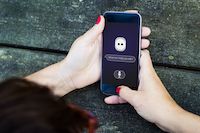Smartphone Use Increases Risk of Obesity, Other Cardiovascular Risks
Investigators examining more than 1000 university students found that those using a smartphone more than 5 hours per day had a 43% increased risk of obesity.

A new study is sounding the alarm on a potential association between excessive smartphone usage on a daily basis and an increased risk of obesity.
Less than 2 weeks after a study revealed that social media use was associated with depression symptoms, investigators in the current study discovered that university students who use their smartphone for 5 or more hours per day had an increased risk of obesity and other cardiovascular risk factors.
"It is important that the general population know and be aware that, although mobile technology is undoubtedly attractive for its multiple purposes, portability, comfort, access to countless services, information and entertainment sources, it should also be used to improve habits and healthy behaviors," said Mirary Mantilla-Morrón, a cardiac pulmonary and vascular rehabilitation specialist at the Health Sciences Faculty at the Simón Bolívar University in Barranquilla, Colombia, and the lead author of the study.
The study, which was presented at the American College of Cardiology Latin America Conference 2019, was designed as a cross-sectional and prospective study involving students from Simón Bolívar University that lasted from June to Dec. 2018. A total of 1060 students were included in the study, which lasted from June to Dec. 2018.

The survey evaluated mainly close, BMI, and hours of smartphone use. Investigators classified obesity in grade 1 (BMI greater than 25 kg/m2) and 2 (BMI greater than 30 kg/m2). 


Of the cohort of 1060, 700 were women and 360 were men. The average of those groups were 19 and 20.3, respectively. The frequency of overweight status and obesity in men were 36.1% and 42.6%. The rates among women were 63.9% and 57.4%. Investigators noted the prevalence of excess weight was 30.2% among all groups. 


Upon analyses, investigators found 26% of subjects who were overweight and 4.6% of those considered obese spent more than 5 hours using their device. Investigators noted students who spent more than 5 hours per day using their smartphone were also twice as likely to drink more sugary drinks, fast food, sweets, snacks and have decreased physical activity.
Additionally, investigators noted a statistically significant association between the numbers of hours of smartphone use and an increase in BMI — in all, those who spent more than 5 hours per day using a smart phone were at 43% higher risk of obesity.
Within their conclusion, investigators wrote that study results suggest smartphone use, in a habitual way, can increase sedentary life and foster the development of cardiovascular risk factors.
"The results of this study allow us to highlight one of the main causes of physical obesity, a risk factor for cardiovascular disease," Mantilla-Morrón said. "We have also determined that the amount of time in which a person is exposed to the use of technologies —specifically prolonged cell phone use — is associated with the development of obesity."
This study, titled “Obesity associated with the hours of use of the smartphone in university students: The technological slavery of the future,” was presented at the ACC Latin America Conference 2019.